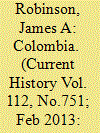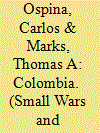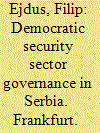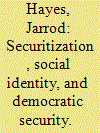| Srl | Item |
| 1 |
ID:
118273


|
|
|
|
|
| Publication |
2013.
|
| Summary/Abstract |
[D]espite all of the gains under the past two presidents, neither administration has broken with the fundamental system of governance that created the country's problems.
|
|
|
|
|
|
|
|
|
|
|
|
|
|
|
|
| 2 |
ID:
131980


|
|
|
|
|
| Publication |
2014.
|
| Summary/Abstract |
From 1965 to the present, Colombia has been confronted by the insurgency of the Revolutionary Armed Forces of Colombia (FARC). The threat reached a new level in 1996 with the advent of mobile warfare, whereby large units sought to neutralize the military in an effort to seize power and institute a Marxist-Leninist regime. Unlike Vietnam, what followed was a regaining of the strategic initiative by the government and a decimation of the insurgent threat. This was accomplished with US assistance but from first to last was driven by Colombian leadership and strategy. The strategy which led to this signal change, 'Democratic Security', unfolded under the leadership of President Álvaro Uribe. It was a civil-military partnership, which sought to expand the writ of Colombian democracy to all elements of society. Securing the population provided the shield behind which economic, social, and political life could occur as driven by the will of the people. It was the agreement upon legitimacy as the strategic goal and reform as the route to that goal which allowed the Colombians and the Americans to work so well together.
|
|
|
|
|
|
|
|
|
|
|
|
|
|
|
|
| 3 |
ID:
104800


|
|
|
|
|
| Publication |
Frankfurt, Peace Research Institute Frankfurt (PRIF), 2010.
|
| Description |
36p.
|
| Series |
PRIF reports no. 94
|
| Standard Number |
9783942532044
|
|
|
|
|
|
|
|
|
|
|
|
Copies: C:1/I:0,R:0,Q:0
Circulation
| Accession# | Call# | Current Location | Status | Policy | Location |
| 056058 | 320.9569/EJD 056058 | Main | On Shelf | General | |
|
|
|
|
| 4 |
ID:
112132


|
|
|
|
|
| Publication |
2012.
|
| Summary/Abstract |
The Democratic Peace stands as one of the most coherent and recognizable programs of study in international relations. Yet despite the pages of research devoted to the subject and claims about its law-like nature, the democratic peace remains a highly contested finding. In large part, this contestation arises out of an enduring question: What exactly keeps democracies from fighting? Drawing on the securitization theory of the Copenhagen School as well as social psychology, this article claims that a critical mechanism of the democratic peace lies at the political junction between policymakers and the public. I argue that the democratic identity of the public, grounded in basic democratic norms essential for the function of any democracy at any time, plays an independent role in the construction of security and foreign policy in the United States. To test the argument, I examine the difficult case of the 1971 Bangladesh War, when President Richard Nixon sent the USS Enterprise carrier group to the Bay of Bengal. Analysis of public statements as well as administration documentation reveals that, while Nixon and national security advisor Henry Kissinger actively saw India as a threat to U.S. interests, they were constrained by their belief that the public would not accept a security argument with respect to a fellow democracy.
|
|
|
|
|
|
|
|
|
|
|
|
|
|
|
|